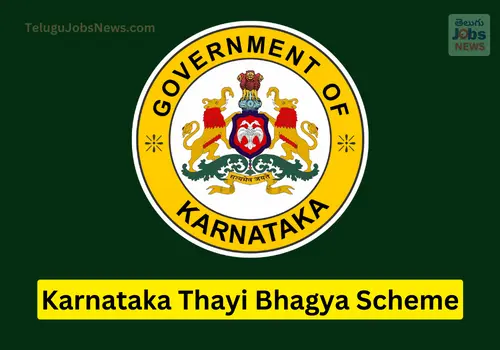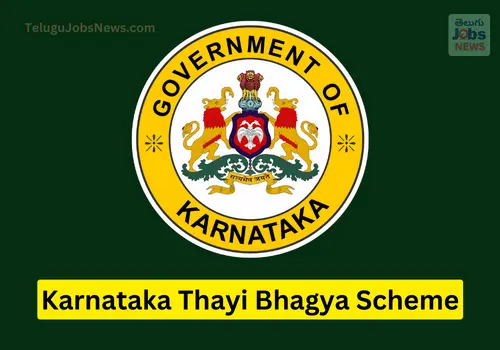The primary objective of the Thayi Bhagya Scheme is to improve maternal and child health by providing financial assistance to pregnant and lactating women in Karnataka.
Table of Contents
Introduction for Thayi Bhagya Scheme:
The Thayi Bhagya Scheme in Karnataka stands as a beacon of hope and support for pregnant and lactating women, addressing critical aspects of maternal and child health. This transformative initiative offers financial assistance, aiming to alleviate economic burdens and ensure access to quality healthcare during the crucial stages of pregnancy and childbirth. In this introduction, we delve into the scheme’s significance, outlining its objectives, key components, and the streamlined application process that empowers women in Karnataka to embrace healthier maternal and child well-being.

Objective for Thayi Bhagya Scheme:
The primary objective of the Thayi Bhagya Scheme is to improve maternal and child health by providing financial assistance to pregnant and lactating women in Karnataka. Maternal and child health remains a significant public health concern globally, particularly in developing regions like India. Karnataka, being one of the populous states in India, has been keen on addressing the challenges surrounding maternal and child health to achieve better health outcomes for its citizens. The Thayi Bhagya Scheme emerges as a strategic intervention to mitigate the barriers faced by pregnant and lactating women, ensuring they receive adequate healthcare and support during critical stages of pregnancy and childbirth.
The scheme is designed to tackle various facets of maternal and child health comprehensively. By offering financial aid to pregnant and lactating women, it aims to alleviate economic burdens associated with maternity and childcare expenses. This financial assistance enables women to access essential healthcare services, nutritional support, and other necessities crucial for ensuring a healthy pregnancy and childbirth experience. Moreover, the scheme underscores the government’s commitment to promoting gender equality and women’s empowerment by prioritizing their health and well-being.
In essence, the overarching objective of the Thayi Bhagya Scheme is to contribute towards reducing maternal and infant mortality rates, improving maternal health outcomes, and fostering the overall well-being of mothers and children in Karnataka.

Key Components for Thayi Bhagya Scheme:
- Financial Assistance: The cornerstone of the Thayi Bhagya Scheme is the provision of financial assistance to pregnant and lactating women. Recognizing the financial constraints often faced by women from marginalized communities, the scheme aims to bridge the gap by offering monetary support to cover various expenses related to maternity and child care. This financial aid is instrumental in ensuring that women can access quality healthcare services without undue financial strain, thereby promoting early detection of complications, regular antenatal care, and timely interventions during pregnancy and childbirth. The financial assistance provided under the scheme is intended to encompass a wide range of expenses, including but not limited to:
- Costs associated with antenatal check-ups, diagnostic tests, and consultations with healthcare providers.
- Expenses related to hospitalization for childbirth, including delivery charges, hospital fees, and medication costs.
- Provision of nutritional supplements and dietary support to pregnant and lactating women to ensure optimal maternal and fetal health.
- Assistance for postnatal care, including follow-up visits, immunizations for newborns, and essential postpartum services. By addressing these financial barriers, the Thayi Bhagya Scheme aims to promote maternal and child health outcomes, encourage institutional deliveries, and reduce the incidence of maternal and infant mortality in Karnataka.
- Eligibility Criteria: The Thayi Bhagya Scheme typically targets women falling below a certain income threshold, with a focus on reaching out to economically disadvantaged and vulnerable populations. The eligibility criteria are designed to ensure that the benefits of the scheme reach those who need them the most, particularly women from marginalized communities who may face significant challenges in accessing healthcare services due to financial constraints. While specific eligibility criteria may vary based on the implementation guidelines established by the government of Karnataka, common parameters include:
- Residency status: Women residing within the geographical boundaries of Karnataka are usually eligible to apply for the scheme.
- Income level: The scheme often targets women from low-income households, with provisions to include those below the poverty line or belonging to economically weaker sections of society.
- Health status: Pregnant and lactating women who require medical assistance and support during pregnancy and childbirth are typically prioritized under the scheme. By targeting women based on these eligibility criteria, the Thayi Bhagya Scheme aims to reach out to those who are most vulnerable and in need of financial assistance for maternal and child health services.
- Implementation: The successful implementation of the Thayi Bhagya Scheme relies on effective coordination and collaboration between various stakeholders, including government agencies, healthcare providers, non-governmental organizations (NGOs), and community-based organizations. The scheme is usually implemented through the healthcare infrastructure and administrative machinery at the state and district levels, with designated departments overseeing its execution and monitoring. Key aspects of the implementation strategy include:
- Establishment of clear guidelines and standard operating procedures (SOPs) for the enrollment process, disbursement of financial assistance, and monitoring of beneficiary outcomes.
- Identification and accreditation of healthcare facilities, including hospitals, health centers, and clinics, where eligible women can access maternal and child health services covered under the scheme.
- Training and capacity-building initiatives for healthcare providers to ensure the delivery of quality care and adherence to best practices in maternal and child health.
- Integration of the scheme with existing healthcare programs and initiatives aimed at promoting maternal and child health, such as immunization drives, family planning services, and nutrition supplementation programs.
- Leveraging technology and digital platforms for efficient management of beneficiary data, tracking of healthcare services availed, and dissemination of information about the scheme to eligible women and their families. Through a well-coordinated implementation approach, the Thayi Bhagya Scheme aims to maximize its reach and impact, ensuring that pregnant and lactating women across Karnataka can access essential maternal and child health services in a timely and effective manner.
Apply : https://dwcd.karnataka.gov.in/english
- Application Process: The application process for the Thayi Bhagya Scheme is designed to be user-friendly and accessible to eligible women, ensuring that they can easily apply for financial assistance to meet their maternity and childcare needs. The application process typically involves several steps, including:
- Outreach and awareness campaigns to inform eligible women about the scheme, its benefits, and the application procedure.
- Distribution of application forms and informational materials through healthcare facilities, community centers, Anganwadi centers, and other relevant channels.
- Assistance and support provided by frontline workers, such as Accredited Social Health Activists (ASHAs), Auxiliary Nurse Midwives (ANMs), and community health workers, in guiding women through the application process and addressing any queries or concerns they may have.
- Collection of necessary documents and information from applicants, including proof of identity, residence, income status, and pregnancy-related details.
- Verification and processing of applications by designated authorities to determine eligibility and approve the disbursement of financial assistance to eligible beneficiaries. Efforts are made to streamline the application process and minimize bureaucratic hurdles to ensure that eligible women can access the benefits of the scheme in a timely and efficient manner. Additionally, provisions may be made to accommodate special cases or emergency situations where immediate assistance is required, such as high-risk pregnancies or childbirth complications.
- Awareness Campaigns: Awareness campaigns play a crucial role in ensuring the success and uptake of the Thayi Bhagya Scheme by reaching out to eligible women and their families and informing them about the scheme’s benefits and how to avail them. These campaigns are typically conducted through a multi-channel approach, utilizing various communication channels and platforms to maximize outreach and engagement. Key components of awareness campaigns include:
- Mass media campaigns: Television, radio, and print media are utilized to broadcast messages and advertisements promoting the Thayi Bhagya Scheme and encouraging eligible women to enroll.
- Community outreach programs: Health camps, awareness sessions, and door-to-door campaigns are organized in rural and urban communities to disseminate information about the scheme, address misconceptions or concerns, and facilitate the application process.
- Engagement with local stakeholders: Collaboration with local leaders, NGOs, self-help groups, and community-based organizations to mobilize support and enhance community awareness about the scheme.
- Use of digital platforms: Leveraging online platforms, social media, and mobile applications to reach a wider audience, especially among younger women, and provide them with information about the scheme. The goal of awareness campaigns is not only to inform women about the existence of the Thayi Bhagya Scheme but also to empower them with knowledge about the importance of maternal and child health, the services available under the scheme, and how they can actively participate in ensuring their well-being and that of their newborns.
- Monitoring and Evaluation: A robust monitoring and evaluation framework is essential for assessing the effectiveness and impact of the Thayi Bhagya Scheme. Continuous monitoring helps identify areas of improvement, ensures the efficient utilization of resources, and provides valuable insights into the scheme’s outcomes. Key components of the monitoring and evaluation process include:
- Data Collection: Regular collection of data related to the number of beneficiaries, services availed, geographical coverage, and demographic information to track the scheme’s reach and impact.
- Performance Indicators: Establishing key performance indicators (KPIs) to measure the scheme’s success, including the percentage increase in institutional deliveries, improvements in antenatal care, and reductions in maternal and infant mortality rates.
- Feedback Mechanisms: Creating mechanisms for obtaining feedback from beneficiaries, healthcare providers, and other stakeholders to understand their experiences, identify challenges, and gather suggestions for improvement.
- Quality Assurance: Implementing quality assurance measures to ensure that the healthcare services provided under the scheme adhere to established standards and guidelines for maternal and child health.
- Periodic Reviews: Conducting periodic reviews and evaluations to assess the scheme’s overall performance, identify bottlenecks or gaps in implementation, and make necessary adjustments to enhance its effectiveness. Monitoring and evaluation are iterative processes that contribute to the ongoing refinement and optimization of the Thayi Bhagya Scheme, aligning it with emerging healthcare needs and ensuring that it continues to be a relevant and impactful initiative for the well-being of women and children in Karnataka.
Benefits of Thayi Bhagya Scheme:
The Thayi Bhagya Scheme encompasses a range of benefits aimed at improving maternal and child health outcomes in Karnataka. These benefits are instrumental in addressing the unique challenges faced by pregnant and lactating women, ensuring their access to essential healthcare services, and fostering a supportive environment for maternal and child well-being. The key benefits of the scheme include:
- Improved Maternal Health:
- The provision of financial assistance enables pregnant women to undergo regular antenatal check-ups, ensuring early detection and management of any potential complications.
- Access to skilled healthcare providers during pregnancy and childbirth contributes to safer deliveries and reduces the risk of maternal mortality.
- Nutritional support and dietary guidance provided under the scheme contribute to the overall well-being of pregnant women, supporting healthy fetal development.
- Enhanced Child Health:
- Financial assistance covers expenses related to postnatal care, including essential healthcare services for newborns such as vaccinations, check-ups, and nutritional support.
- Encouraging institutional deliveries through the scheme contributes to a safer and hygienic environment for childbirth, reducing the risk of neonatal infections and complications.
- Timely interventions and healthcare services for infants contribute to reduced infant mortality rates and improved overall child health outcomes.
- Encouragement of Institutional Deliveries:
- The Thayi Bhagya Scheme incentivizes institutional deliveries by providing financial support to cover hospitalization expenses during childbirth.
- Institutional deliveries are associated with lower risks of complications, improved hygiene, and better access to skilled medical care, contributing to safer childbirth experiences for women.
- Financial Relief for Families:
- The financial assistance provided under the scheme helps alleviate the economic burden on families, especially those from economically disadvantaged backgrounds.
- Families are relieved from the financial stress associated with maternity and childcare expenses, enabling them to focus on the well-being of the mother and child.
- Promotion of Maternal and Child Well-Being:
- By addressing the economic and healthcare needs of pregnant and lactating women, the Thayi Bhagya Scheme contributes to the overall well-being of mothers and children.
- Improved maternal and child health outcomes positively impact the long-term health and development of children, creating a foundation for a healthier future generation.
In summary, the Thayi Bhagya Scheme brings forth a multitude of benefits that extend beyond immediate financial assistance. It plays a pivotal role in fostering a culture of maternal and child health, contributing to the broader goal of creating healthier communities and ensuring the well-being of women and children in Karnataka.
Conclusion:
The Thayi Bhagya Scheme in Karnataka stands as a significant initiative aimed at improving maternal and child health outcomes in the state. With its focus on providing financial assistance to pregnant and lactating women, the scheme addresses critical challenges faced by vulnerable populations, ensuring they receive timely and quality healthcare services during pregnancy and childbirth. The multi-faceted approach of the scheme, encompassing financial support, awareness campaigns, and robust monitoring mechanisms, reflects a comprehensive strategy to enhance maternal and child well-being.
Through the Thayi Bhagya Scheme, Karnataka demonstrates its commitment to promoting gender equality, women’s empowerment, and the overall health and development of its citizens. The scheme aligns with national and global efforts to achieve Sustainable Development Goal 3, which aims to ensure healthy lives and promote well-being for all, with a specific focus on maternal and child health.
As with any public health initiative, ongoing evaluation, feedback, and adaptation are crucial to ensuring the continued relevance and effectiveness of the Thayi Bhagya Scheme. By addressing the economic barriers that often hinder access to maternal and child health services, the scheme contributes not only to immediate health outcomes but also to the long-term health and prosperity of communities in Karnataka.
In conclusion, the Thayi Bhagya Scheme exemplifies the potential of targeted interventions and government-led initiatives to bring about positive change in the lives of women and children. As Karnataka continues to implement and refine this scheme, it serves as a beacon of progress in the realm of maternal and child health, setting a precedent for other regions to prioritize and invest in the well-being of their maternal and child populations.


